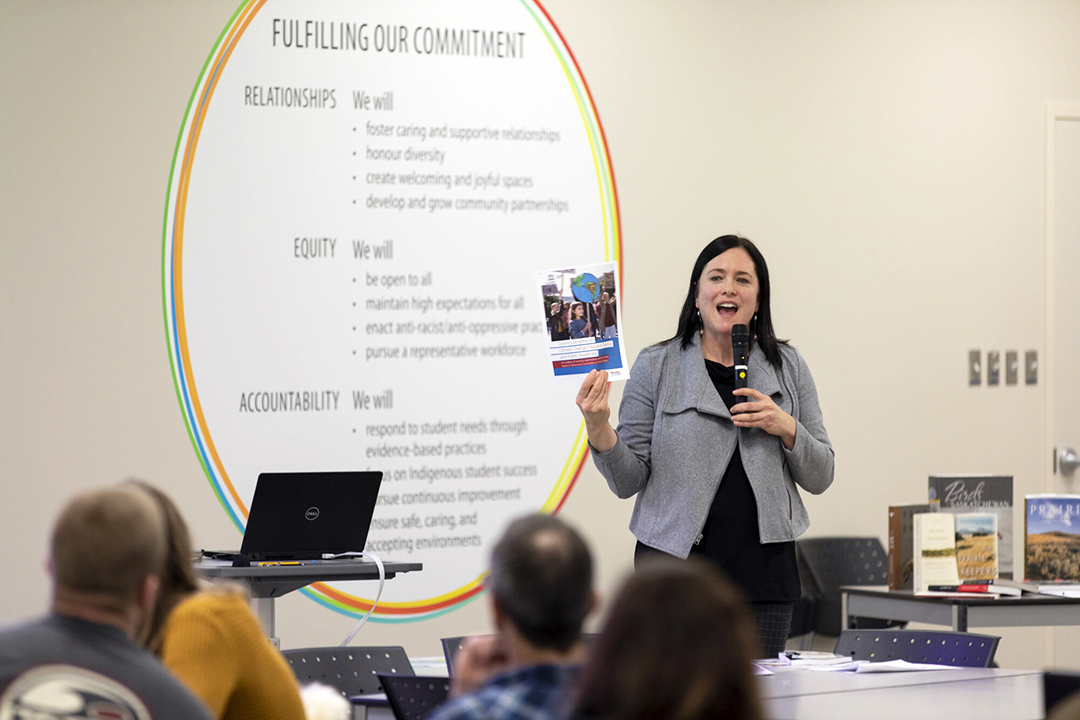
New agreement supports enhanced environmental education in public schools
Saskatoon Public Schools (SPS) and the Sustainability and Education Policy Network (SEPN) at the University of Saskatchewan (USask) have signed a Memorandum of Understanding (MOU) to further sustainability and climate change education initiatives.
The new agreement supports sustainability and climate change education for SPS administrators and teachers, and includes the development of programming that helps K-12 students gain knowledge and be active in sustainable living, engaged citizenship and well-being. SPS and SEPN will also collaborate on opportunities for sustainability and climate change-related research.
“As a public school division, our role is to support our entire community, which includes developing the next generation of citizens who will contribute to it,” said SPS Board Chair Colleen MacPherson. “This partnership with SEPN will present our students with valuable learning about the environment, but also actively engage them in being citizens and understanding their role both locally and globally. This type of learning is not only significant for the students, but also for our community.”
The path to the MOU began in the fall of 2019 as a response to student interest in the Global Climate Strike demonstrations. This led to discussions between SPS and Dr. Marcia McKenzie (PhD), director of SEPN and professor in the USask College of Education.
“SPS was enthusiastic about the idea of working together to help engage teachers and students in inquiry-based education that strives for climate action,” said McKenzie. “Today’s youth are very aware of the climate crisis and they would like to see their teachers, their schools and the school division engaged in leadership on the environment as well.”
In January, SPS and SEPN held professional learning opportunities for teachers interested in environmental education and effective ways classroom learning can respond. The content was based on SEPN’s multi-year international research examining effective education policy and practice in sustainability.
“With the help of SEPN, we have initiated a strategic and long-term commitment to climate change education in the school division,” said SPS Superintendent Dave Derksen. “Our school division has established a climate change educators network and we are committed to developing students as young citizens ready to take on this complex issue with courage, compassion and creativity. With SEPN’s help we will sustain these efforts and study the impact.”
Researchers with SEPN have been engaged in climate change education initiatives since 2011, and in early June received a $2.5-million grant from the Social Sciences and Humanities Research Council to advance climate change education on an international scale.
“We’ve found that while the field of climate change education is still new, research suggests good climate change education needs to include focus on the social and emotional aspects of learning about climate change. School divisions can show leadership by embedding sustainability not only in teaching and learning, but also through reducing the environmental footprint of their buildings and operations, community partnerships, and overall governance priorities,” said McKenzie.
For the students concerned with climate change and its impacts on their generation and generations to come, this MOU is a step in the right direction.
“We hope this will lead to actual changes in our schools, not just learning what climate change is,” said Helena Blenkinsop and Vaeda Bly, Grade 8 SPS students. “We want to hear our teachers say, ‘We’re going to tell you about this issue and we’re also going to tell you what we’re doing about it as a school.’”

